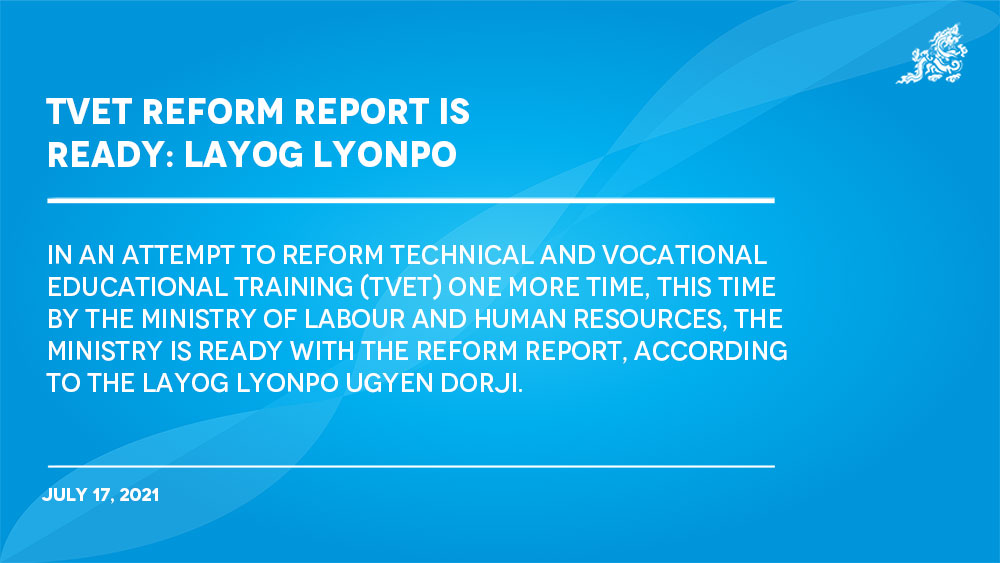Yangchen C Rinzin
In an attempt to reform Technical and Vocational Educational Training (TVET) one more time, this time by the ministry of labour and human resources, the ministry is ready with the reform report, according to the Layog Lyonpo Ugyen Dorji.
TVET reform talk has been going for almost two and a half years. One of the major reforms was to delink TVET from the labour ministry and make TVET autonomous.
Major reforms in TVET sector started in early 2000 and 2003; it came under the direct administration of the labour ministry.
However, every time when the reform work took place, the shortcomings were always same.
For years, it has been raised in different reports, including the National Council study report that majority of the problems identified were the image of TVET, TVET lacked infrastructure, and capacity building and skills required from the institutes were not relevant in the market.
Yet, little has been done to address the issues apart from several meetings and discussions on the issue.
Lyonpo Ugyen Dorji said that when reforms could not take place for years, it was unrealistic for this government to complete the reform in a year.
“But we’re putting all our efforts to reform this time and it’s shaping up,” Lyonpo said. “Reform work is difficult because we’ve to start from scratch, but this time we’ve almost finalised the reform report.”
The reform report was presented once during the Dhensa meet and was asked to rework based on feedback. The report will be submitted to the Cabinet for approval.
Reform reports – what to expect
Lyonpo said that TVET was the last choice for many and were not interested in the TVET. The most important thing that reform should take care of is to make the TVET attractive, he added.
“This is why the reform must ensure quality, efficiency, efficacy, and prepare students for the future skills,” Lyonpo said. “So the first goal of the TVET reform is to make TVET institutions appealing with wholesome education.”
The second goal would be to reform the curriculum framework by referring international curriculum and keeping it updated with the current situation.
The reform will also look into the development of human resources, provide opportunities for instructors to upgrade their qualifications in different international institutions.
The government is already working on international collaboration with Korea, Germany, Switzerland, Australia, and Singapore.
Another reform would be to collaborate with various industries and link with TVET to provide jobs. Currently, due to poor linkages between industries and TVET, the TVET graduates find it difficult to get jobs.
From PMO and back
Besides passing the reform work from one department to another to ministry, then to the Prime Minister’s Office (PMO) and finally coming back to the ministry, the reform has never taken place in the last two years.
The government in 2019 initiated TVET reforms and the PMO took over the TVET programme from the ministry. An interim TVET reform project office was established with a chief executive officer.
However, the interim office with the PMO returned the TVET programme to the labour and human resources ministry to implement the reform after almost two years.
Lyonpo said that the interim office had submitted five reports on TVET to be renamed as Bhutan Innovation and Technical Education, inventory of technical institutes and facilities, and TVET education pathway. The office also submitted a report on the financing where the ADB agreed to grant loan and the final report on Bhutan Innovation Hub.
Lyonpo added that the ministry worked on the reform report taking into all these reports too. He added that the government did not reject what was submitted by the interim office.
“However, the plan to make TVET autonomous might take time because of the fact that the programme was returned to the ministry, delinking is not happening soon,” Lyonpo said. “Interim office was formed to work on making it autonomous.”
Lyonpo said that even if the reform is approved, the rollout would depend on the country’s economy. “Economy and TVET reform must go together because if we produce TVET graduates and jobs are not available then we will fail again.”
The reform is also marked as a priority in the 12th Plan and about Nu 2.1 billion budget is being allocated.
“Even if we manage to just ready the reform report during our tenure, it’ll be an achievement. The next government can implement the plan,” Lyonpo said.
Edited by Jigme Wangchuk


